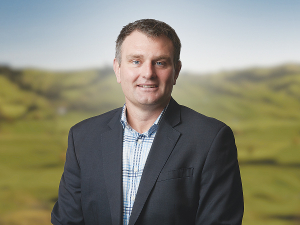Rabobank's latest rural confidence survey shows a minus 72% confidence reading - eclipsing last June’s historic minus 57% - the lowest in the survey’s 20-year history.
Some 77% of farmers expect conditions in the broader agricultural economy to worsen over the next 12 months, with only 5% expecting conditions to improve. Rabobank New Zealand country banking general manager Bruce Weir says lower commodity prices are the main source of farmer anxiety, with 54% of farmers attributing this as a reason for their pessimistic view on the year ahead.
“Following our last survey, we saw Fonterra lower the mid-point of their farmgate milk price forecast from $8.00kg/MS to $6.75kg/MS, while schedule prices for sheep and beef products have also tumbled,” Weir says.
“Fonterra’s subsequent revision of the milk price to a new mid-point of $7.25kg/MS is a significant boost for the industry. However, this lift was made after the survey period and is therefore not reflected in the latest results.”
Other pressing concerns for farmers are rising input costs (46%), government policies (35%), overseas markets (29%) and rising interest rates (18%). The latest survey show that – for the first time since 2020 – government policy was not in the top two main reasons for concern. It was also cited as the main reason for optimism among farmers expecting conditions to improve.
Other pressing concerns for farmers are rising input costs (46%), government policies (35%), overseas markets (29%) and rising interest rates (18%). The latest survey show that – for the first time since 2020 – government policy was not in the top two main reasons for concern. It was also cited as the main reason for optimism among farmers expecting conditions to improve.
Weir urges farmers not to overlook their own health and wellbeing, with the survey finding more farmers less optimistic about the prospects for their own farm businesses and more likely to view their operations as unviable.
There is a small silver lining though, with an uplift in growers’ confidence in their operations, rising from -8% to +22%.
Rabobank says it has launched a new module of its free one-day financial skills workshop. It will run 19 workshops across the country, open to its clients and non-clients, with more scheduled to come in late 2023- early 2024.
“Given all the challenges facing industry participants, it’s important to reaffirm Rabobank’s commitment to our food and agri clients and to the wider sector,” Weir says.



















